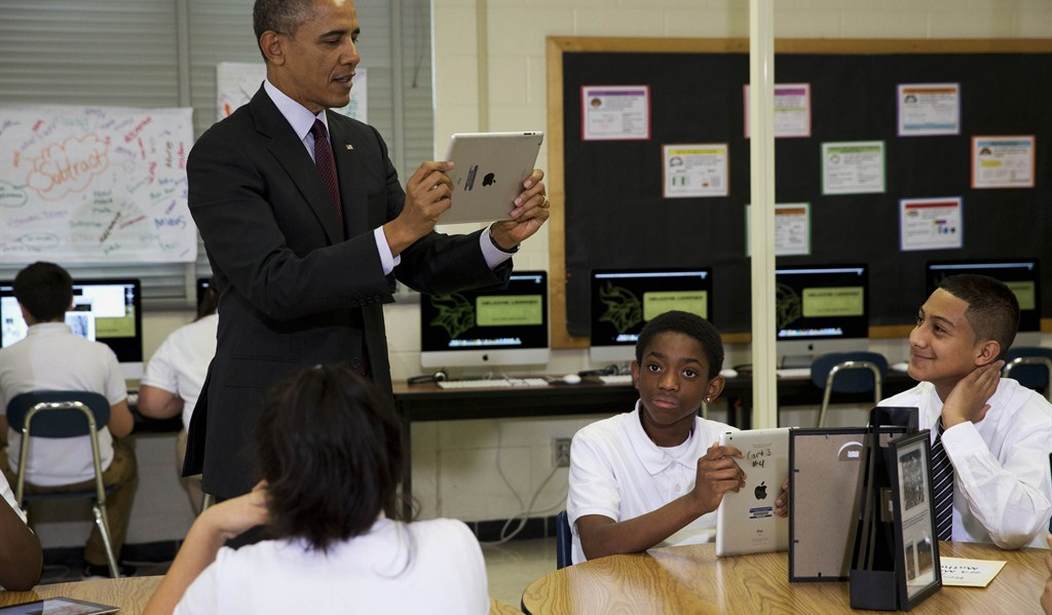From its beginning, the Common Core State Standards initiative has flown under the radar. Its funding, its implementation, and the substance of the standards it proposes have received little public attention, but all of them are questionable.
What troubles me the most is how fast these standards were adopted and how little transparency there was in the process. Not one state legislature voted on the Common Core standards. In the forty-five states where they have been adopted, it was by an act of the governor, the state secretary of education, or the state board of education. The people most affected by this enormous policy change—parents and teachers—never had a chance to weigh in.
We have seen the failures of No Child Left Behind. Why would we hastily embrace a new set of national standards that further complicate education with little promise of improving our children’s chances at success?
The Home School Legal Defense Association points out that the U.S. Department of Education enticed states to jump on the Common Core train quickly by offering early adopters federal funds from the Obama administration’s Race to the Top program.
Diane Ravitch of NYU, a historian of education who has served as a policy analyst in both Republican and Democratic administrations, is a stern critic of Common Core. In a speech last January she voiced her concerns, which include the following:
- “From the outset, the Common Core standards were marked by the absence of public participation, transparency, or educator participation. In a democracy, transparency is crucial, because transparency and openness build trust. Those crucial ingredients were lacking.”
Recommended
- “Some states—like Kentucky–adopted the Common Core standards sight unseen. Some—like Texas—refused to adopt them sight unseen. Some—like Massachusetts—adopted them even though their own standards were demonstrably better and had been proven over time.”
- “Early childhood educators are nearly unanimous in saying that no one who wrote the standards had any expertise in the education of very young children. More than 500 early childhood educators signed a joint statement complaining that the standards were developmentally inappropriate for children in the early grades. The standards, they said, emphasize academic skills and leave inadequate time for imaginative play.”
- “There is something about the Common Core standards and testing, about their demand for uniformity and standardization, that reeks of early twentieth century factory-line thinking. There is something about them that feels obsolete.”
While some states are beginning to retreat on implementation of these standards, many are not, and many more Americans don’t even know what the Common Core standards are since there was so little public debate in their adoption. I want to lend my voice to slowing this process down and stopping any more top-down, nationalized education standards.
If you want to stop Common Core, here’s what you can do right now:
- Read up on Common Core. Visit the Heritage Foundation and HSLDA websites, which offer lots of valuable information about Common Core.
- If you are a parent, call your school district administration and ask them if they are implementing Common Core standards. Ask for a copy of their Common Core standards policy.
- Attend a school board meeting in your community and ask about Common Core.
- Write to your state and federal legislators and tell them you oppose funding Common Core.
If you think Common Core is too big to stop, consider the story of two moms in Indiana—Heather Crossin and Erin Tuttle—who noticed a change in the difficulty of their children’s homework. They started paying more attention and took action—action that ultimately led to Indiana’s retreat from Common Core. Check out Hoosiers Against Common Core to learn more about their efforts.
We all know that our country’s public education system isn’t working, and we all want to improve opportunities for our children, but more government intervention is not the answer. Instead, parents, teachers, school districts, and local communities should be making the important decisions about education.
Our children need to finish school with the values and the knowledge to work hard, serve their communities, and prosper. Those values and that knowledge won’t be instilled by the federal government, Common Core, or No Child Left Behind. They won’t be instilled even by standards set at the state level. They come from parents, who should have control over the education of their children.
Let’s start a broad movement to put parents back in charge of the educational system. Fighting Common Core and other top-down education reforms is a good start.
























Join the conversation as a VIP Member